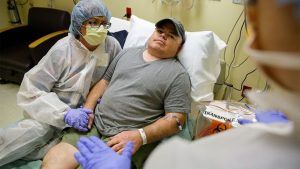Jocelyn Kaiser in Science:
 The first test of a new gene-editing tool in people has yielded early clues that the strategy—an infusion that turns the liver into an enzyme factory—could help treat a rare, inherited metabolic disorder. Today, the biotech company Sangamo Therapeutics in Richmond, California, reported data suggesting that two patients with Hunter syndrome are now making small amounts of a crucial enzyme that their bodies previously could not produce. But the company is still a long way from providing evidence that the new method can improve Hunter patients’ health. Hunter syndrome results from a mutation in a gene for an enzyme that cells need to break down certain sugars. When these sugars, called glycosaminoglycans (GAGs), build up in tissues, they damage organs such as the heart and lungs, sometimes leading to developmental delays, brain damage, and early death. The new treatment uses a gene-editing tool called zinc finger nucleases (ZFNs). ZFNs were developed earlier than CRISPR, the hugely popular gene-editing tool, and Sangamo has already used them to edit cells in a dish that were then returned to a patient’s body.
The first test of a new gene-editing tool in people has yielded early clues that the strategy—an infusion that turns the liver into an enzyme factory—could help treat a rare, inherited metabolic disorder. Today, the biotech company Sangamo Therapeutics in Richmond, California, reported data suggesting that two patients with Hunter syndrome are now making small amounts of a crucial enzyme that their bodies previously could not produce. But the company is still a long way from providing evidence that the new method can improve Hunter patients’ health. Hunter syndrome results from a mutation in a gene for an enzyme that cells need to break down certain sugars. When these sugars, called glycosaminoglycans (GAGs), build up in tissues, they damage organs such as the heart and lungs, sometimes leading to developmental delays, brain damage, and early death. The new treatment uses a gene-editing tool called zinc finger nucleases (ZFNs). ZFNs were developed earlier than CRISPR, the hugely popular gene-editing tool, and Sangamo has already used them to edit cells in a dish that were then returned to a patient’s body.
Sangamo’s new results are for four men with a mild form of Hunter disease. The participants were already receiving a standard Hunter syndrome therapy: weekly injections of iduronate-2-sulfatase (IDS), the enzyme they lack. However, blood levels drop within a day of injections, limiting their effectiveness. To test the ZFNs, Sangamo injected patients with harmless viruses that ferry DNA for the nucleases into their liver cells, along with a good copy of the IDS gene. The ZFNs snip DNA in a specific location, which the cells then repair using the provided IDS gene. The landing spot is within the gene for the protein albumin, which has a strong on–off switch that controls the new IDS gene. Because of this powerful promotor, less than 1% of a person’s liver cells may produce sufficient amounts of IDS to treat Hunter disorder, says Sangamo President and CEO Sandy Macrae. Last November, Sangamo treated the first patient in its trial, Brian Madeux. Today, geneticist Joseph Muenzer of the University of North Carolina in Chapel Hill, principal investigator for the trial, reported results for Madeux and three more patients at a meeting in Athens, Greece.
More here.
